Beekeeping offers a unique path to mental wellness through the soothing hum of hives and the mindful care of bees. You'll find yourself fully present as you tend to your colonies, fostering a deep connection with nature. The rhythmic tasks of hive maintenance can induce a meditative state, reducing stress and anxiety. As you develop your skills, you'll build confidence and join a supportive community of fellow beekeepers. Harvesting honey provides a sense of accomplishment and strengthens social bonds. Whether you're seeking calm, mindfulness, or a new challenge, beekeeping can be your gateway to improved mental well-being. Discover how this buzzing hobby can transform your life.
The Calming Nature of Beekeeping
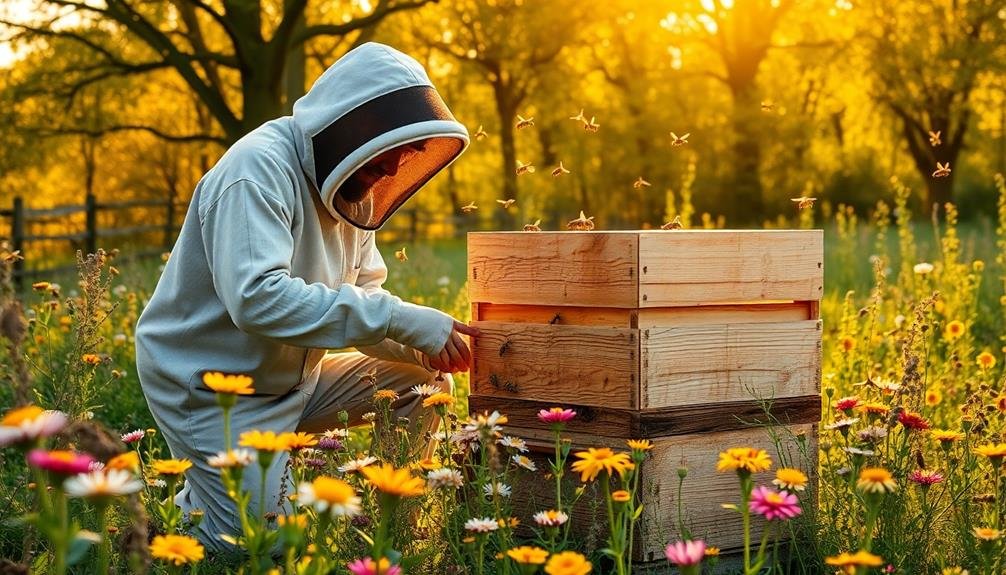
Humming with gentle activity, a beehive offers a unique sanctuary for those seeking mental solace. As you approach the hive, you're enveloped in a world of purpose and order. The steady buzz of bees at work creates a soothing white noise, drowning out the chaos of everyday life.
You'll find that beekeeping demands your full attention, forcing you to be present in the moment. As you carefully inspect frames and tend to your colonies, your mind naturally shifts away from stressors and worries. The rhythmic movements of smoking the hive and handling frames become a form of moving meditation.
The process of caring for bees also instills a sense of responsibility and connection to nature. You're not just an observer but an active participant in the ecosystem. This engagement can boost your sense of purpose and self-worth.
Moreover, beekeeping often involves periods of quiet observation. These moments of stillness allow you to practice mindfulness, focusing on the intricate details of bee behavior and the subtle changes in your hive. This mindful practice can greatly reduce anxiety and improve overall mental well-being.
Mindfulness in the Apiary
The apiary serves as a natural mindfulness center, inviting beekeepers to engage all their senses. As you approach the hives, you'll notice the gentle hum of bees at work, the sweet scent of honey, and the warmth of the sun on your skin. These sensory experiences naturally draw you into the present moment, encouraging a state of mindfulness.
When tending to your bees, you're required to focus intently on the task at hand. This concentrated attention helps quiet the mind and reduce stress. You'll find yourself becoming acutely aware of your movements, breathing, and surroundings as you work with the bees.
The practice of mindfulness in beekeeping extends beyond the apiary, offering benefits such as:
- Improved emotional regulation
- Enhanced self-awareness
- Increased patience and resilience
As you develop your beekeeping skills, you'll discover that the bees themselves become your teachers in mindfulness. Their collective behavior demonstrates the power of living in the present and working harmoniously towards a common goal.
Beekeeping as a Meditative Practice
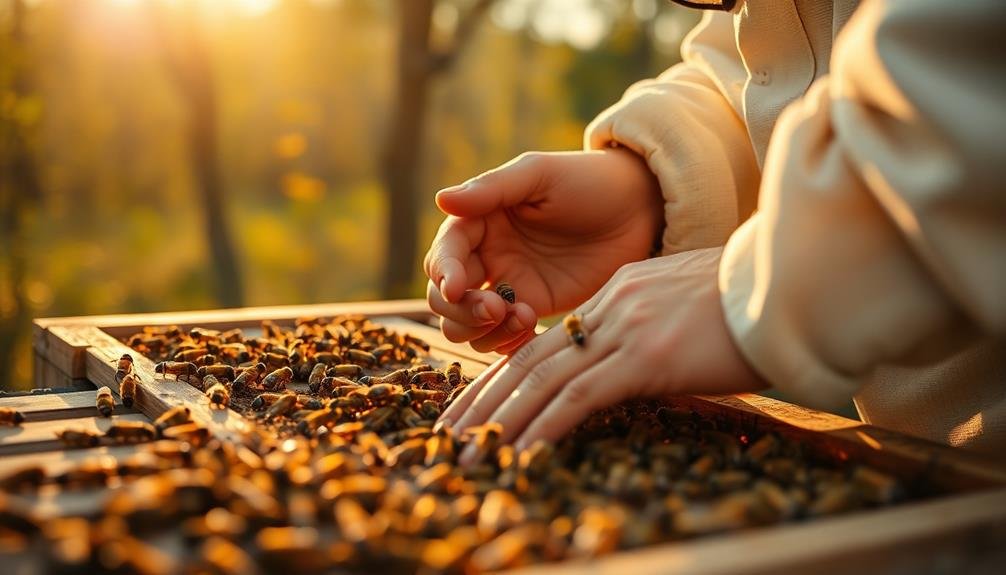
You'll find that beekeeping offers a unique form of meditation through mindful observation techniques.
As you connect with nature, you'll become attuned to the sights, sounds, and rhythms of the hive.
The repetitive, purposeful motions of hive maintenance can create a meditative state, allowing you to focus on the present moment and find tranquility in your apiary work.
Mindful Observation Techniques
Beekeepers often discover that their craft offers more than just honey production; it can serve as a gateway to mindfulness and meditation. As you tend to your hives, you'll find numerous opportunities to practice mindful observation techniques that enhance your mental well-being.
Start by focusing on your breath as you approach the hives. Notice the subtle changes in the air's temperature and scent. As you open the hive, engage your senses fully:
- Listen to the buzzing, distinguishing between different pitches and intensities
- Observe the intricate patterns of honeycomb and the bees' movements
- Feel the vibrations of the hive through your gloved hands
Pay attention to your body's reactions and any thoughts that arise, acknowledging them without judgment.
As you work, maintain a gentle awareness of your movements and their impact on the bees. This mindful approach not only improves your beekeeping skills but also cultivates a sense of presence and calm.
Connecting With Nature
Immersing yourself in the natural world through beekeeping offers a unique opportunity to connect with nature on a profound level. As you tend to your hives, you'll become attuned to the subtle changes in your environment, from shifting weather patterns to the blooming of different flowers throughout the seasons.
You'll develop a deeper appreciation for the intricate ecosystem that supports your bees, learning to identify various plants and their importance to pollinators. This heightened awareness extends beyond your apiary, enhancing your overall connection to the natural world.
Beekeeping also fosters a sense of responsibility towards the environment. You'll likely find yourself making more eco-conscious decisions, such as avoiding pesticides and creating bee-friendly gardens. This stewardship can be incredibly fulfilling, knowing you're actively contributing to the well-being of these vital pollinators and the broader ecosystem.
Moreover, the physical act of working with your hives encourages you to spend more time outdoors, soaking in the benefits of fresh air, sunlight, and gentle exercise. This regular exposure to nature can greatly reduce stress and improve your overall mental well-being.
Rhythmic Hive Maintenance
The rhythmic hum of a beehive serves as a natural metronome for mindfulness. As you engage in hive maintenance, you'll find yourself falling into a meditative state. The repetitive tasks of inspecting frames, cleaning equipment, and monitoring the bees' activity create a soothing routine that can calm your mind and reduce stress.
You'll develop a heightened awareness of your surroundings and the bees' behavior. This mindful approach to beekeeping encourages you to:
- Observe subtle changes in the hive's atmosphere
- Listen attentively to the different buzzing tones
- Focus on your breath and movements as you work
The slow, deliberate pace of hive maintenance allows you to escape the frenetic energy of daily life. You'll learn to move with purpose and care, minimizing sudden movements that might disturb the bees.
This practiced gentleness can translate into other areas of your life, fostering patience and calm in challenging situations.
As you become more attuned to the bees' rhythms, you'll find yourself naturally aligning with the cycles of nature. This connection can ground you, providing a sense of stability and peace in an often chaotic world.
Connecting With Nature Through Bees
As a beekeeper, you'll find yourself spending more time outdoors, keenly observing the intricate behaviors of your buzzing companions.
You'll notice how bees interact with their environment, from their foraging patterns to their communication methods within the hive.
This newfound awareness can inspire you to plan your garden with pollinators in mind, creating a haven for bees and other beneficial insects.
Observing Bee Behavior Outdoors
Countless opportunities for connecting with nature await those who observe bee behavior outdoors.
You'll gain a deeper appreciation for these fascinating creatures by watching them in their natural habitat. Start by finding a quiet spot near flowering plants or in a garden, and settle in to observe the bees at work.
As you watch, pay attention to:
- The types of flowers bees visit most frequently
- How long they spend on each bloom
- Their flight patterns and interactions with other bees
You'll notice that bees are methodical in their approach, moving from flower to flower with purpose.
They're not just randomly flitting about; they're following specific routes and communicating with their hive mates through intricate dances.
Garden Planning for Pollinators
Planning a garden for pollinators offers a wonderful way to connect with nature through bees. You'll create an inviting space for these essential creatures while enhancing your outdoor environment. Start by selecting a variety of native plants that bloom at different times throughout the season. This guarantees a constant food source for bees and other pollinators.
Consider the following plants and their benefits:
| Plant Type | Benefits for Pollinators |
|---|---|
| Lavender | Rich in nectar, attracts various bee species |
| Sunflowers | Provides pollen and seeds for bees and birds |
| Coneflowers | Long-blooming, attractive to bees and butterflies |
| Bee balm | Nectar-rich, attracts hummingbirds and bees |
| Herbs | Offers diverse food sources for many pollinators |
When designing your garden, group similar plants together to create visually appealing and efficient feeding stations. Incorporate a water source, such as a shallow birdbath or fountain, to provide hydration for pollinators. Avoid using pesticides, as they can harm beneficial insects. Instead, embrace natural pest control methods to maintain a healthy ecosystem. By creating a pollinator-friendly garden, you'll not only support local bee populations but also enjoy a thriving, vibrant outdoor space that contributes to your mental well-being.
Building Confidence Through Beekeeping Skills
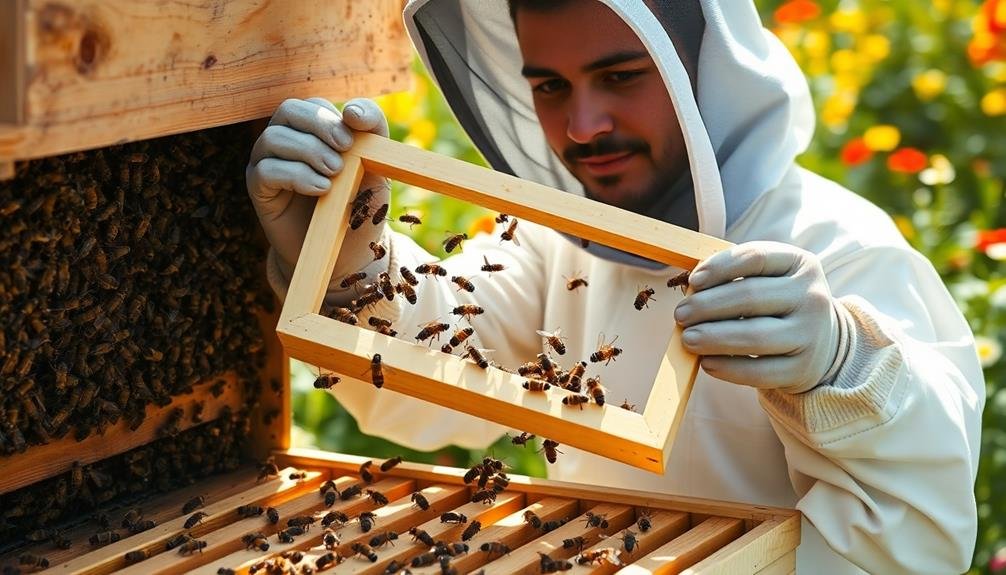
Four key aspects of beekeeping help build confidence in practitioners. As you develop your skills, you'll notice improvements in problem-solving, decision-making, patience, and self-reliance.
These abilities extend beyond the apiary, positively impacting other areas of your life.
Beekeeping challenges you to:
- Overcome fears and anxieties
- Master complex techniques
- Adapt to unpredictable situations
As you gain experience, you'll find yourself becoming more assertive and self-assured. You'll learn to trust your instincts when handling bees, making split-second decisions that protect both you and your colonies.
This newfound confidence will spill over into your personal and professional life.
You'll also develop a sense of accomplishment as you successfully manage your hives, harvest honey, and contribute to local ecosystems. The tangible results of your efforts provide concrete evidence of your capabilities, reinforcing your self-worth.
Moreover, beekeeping often involves sharing knowledge with others, whether through mentoring novice beekeepers or educating the public about pollinator conservation.
These interactions further boost your confidence as you recognize your expertise and its value to others.
Social Benefits of Beekeeping Communities
Beekeeping not only builds personal confidence but also fosters strong social connections. As you immerse yourself in this hobby, you'll find yourself part of a vibrant community of like-minded individuals. Local beekeeping associations offer regular meetings, workshops, and events where you can share experiences, learn from seasoned beekeepers, and make new friends.
You'll discover that beekeepers are often enthusiastic to help newcomers, creating a supportive environment for learning and growth. These connections can lead to mentorship opportunities, where experienced beekeepers guide you through challenges and celebrate your successes.
Online forums and social media groups dedicated to beekeeping provide platforms for instant communication and knowledge sharing. You can ask questions, share photos of your hives, and discuss the latest beekeeping trends with enthusiasts from around the world.
Participating in community gardens or farmers' markets as a beekeeper can also expand your social circle. You'll interact with gardeners, farmers, and customers interested in your honey and beeswax products.
These interactions can lead to meaningful relationships and a sense of belonging within your local community.
Honey Harvesting: A Rewarding Experience
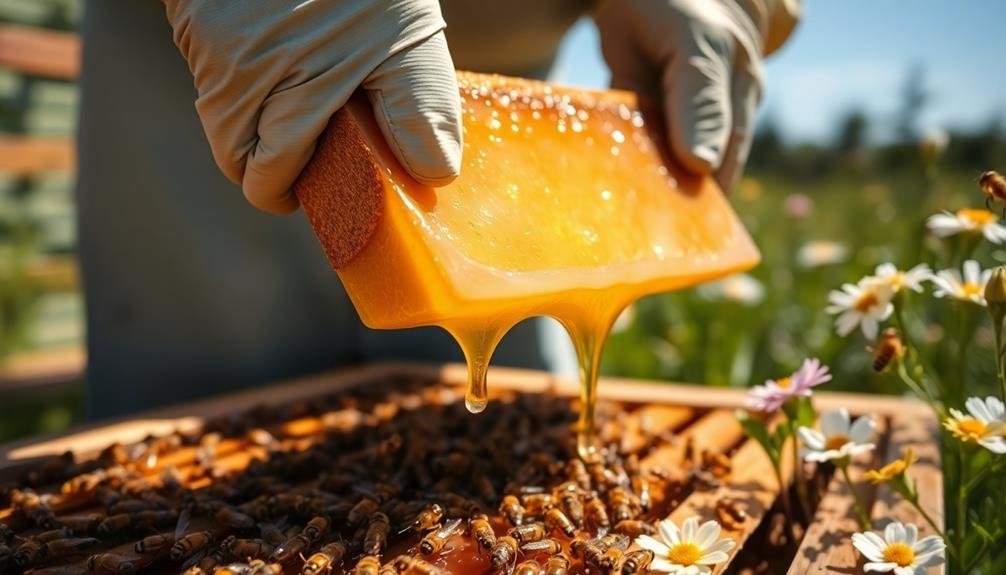
One of the most gratifying aspects of beekeeping is harvesting your own honey. As you extract the golden nectar from the hives, you'll experience a sense of accomplishment and connection to nature. The process of honey harvesting is both an art and a science, requiring patience, skill, and respect for the bees' hard work.
When it's time to harvest, you'll need to carefully remove the honeycomb frames from the hive. You'll then uncap the cells and extract the honey using specialized equipment. The sweet aroma that fills the air during this process is truly intoxicating, heightening your senses and deepening your appreciation for the bees' efforts.
Beyond the joy of tasting your own honey, harvesting offers additional benefits:
- It provides insight into the health of your hive
- You can gauge the success of your beekeeping practices
- It allows you to share the fruits of your labor with friends and family
As you bottle your honey, you'll feel a sense of pride knowing that you've participated in a centuries-old tradition. This rewarding experience not only yields a delicious product but also reinforces your connection to the natural world and your role as a steward of these remarkable insects.
Overcoming Fears With Bee Therapy
Have you ever considered that the very creatures you might fear could be the key to overcoming your anxieties? Bee therapy, also known as apitherapy, offers a unique approach to conquering fears and improving mental well-being.
By gradually exposing yourself to bees in a controlled environment, you'll learn to manage your anxiety and develop a sense of calm around these buzzing insects.
As you engage with bees, you'll notice your fear response diminishing over time. This process helps rewire your brain, creating new neural pathways that associate bees with positive experiences rather than fear. You'll gain confidence as you handle frames, observe hive behavior, and even participate in honey extraction.
Bee therapy isn't just about overcoming fear; it's also about connecting with nature and finding mindfulness.
The focused attention required in beekeeping can help reduce stress and anxiety, promoting a sense of peace and accomplishment. You'll develop patience, observation skills, and a deeper appreciation for the environment.
Embracing Patience in Beekeeping
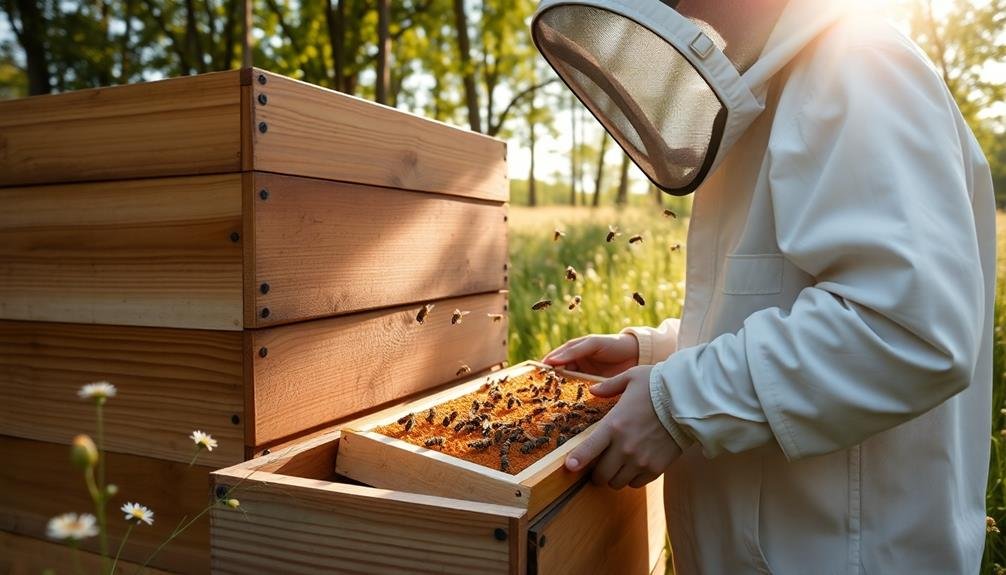
Patience is the cornerstone of successful beekeeping. As you begin this journey, you'll quickly realize that bees operate on their own timeline. You can't rush their natural processes or force them to produce honey faster. Instead, you'll need to cultivate a sense of calm and learn to work with nature's rhythms.
Embracing patience in beekeeping offers several mental health benefits:
- It teaches you to slow down and be present in the moment
- It helps reduce stress and anxiety by promoting a peaceful mindset
- It fosters a deeper connection with nature and its cycles
You'll find that waiting for your bees to establish their colony, build comb, and produce honey becomes an exercise in mindfulness. As you observe their progress over weeks and months, you'll develop a greater appreciation for the intricate workings of a hive.
This patience extends beyond the bees themselves, as you'll also need to adapt to seasonal changes and weather patterns that affect your colonies. By embracing this unhurried approach, you'll not only become a better beekeeper but also cultivate a more balanced and centered state of mind.
Frequently Asked Questions
How Much Does It Cost to Start Beekeeping as a Hobby?
You'll need around $500-$1,000 to start beekeeping. This covers basic equipment like hives, protective gear, and tools. Don't forget the cost of bees themselves, which can range from $100-$200 per colony.
What Protective Gear Is Essential for Beginner Beekeepers?
You'll need essential protective gear as a beginner beekeeper. Start with a full-body suit or jacket with veil, gloves, and sturdy boots. Don't forget a hive tool and smoker to safely manage your bees during inspections.
Are There Any Legal Restrictions on Keeping Bees in Residential Areas?
You'll find that legal restrictions on beekeeping vary by location. Check your local zoning laws and homeowners' association rules. Some areas require permits, limit hive numbers, or mandate specific distances from property lines. Always research your city's regulations before starting.
How Much Time per Week Does Beekeeping Typically Require?
You'll typically spend 1-2 hours per week on your beehives during peak season. In winter, it's less time-consuming. Your commitment can vary based on hive numbers, experience level, and any issues that arise with your bees.
Can People With Bee Allergies Safely Engage in Beekeeping?
If you're allergic to bees, it's risky to engage in beekeeping. You'll need to consult an allergist first. They might recommend immunotherapy or strict safety measures. Even then, it's not guaranteed to be safe for you.
In Summary
You've discovered that beekeeping is more than just a hobby—it's a path to mental wellness. As you've embraced this buzzing world, you've found calm, mindfulness, and connection with nature. You've built confidence, joined a supportive community, and reaped sweet rewards. Through bee therapy, you've conquered fears and learned patience. So keep tending to your hives, and let the bees continue to nurture your mind and spirit.


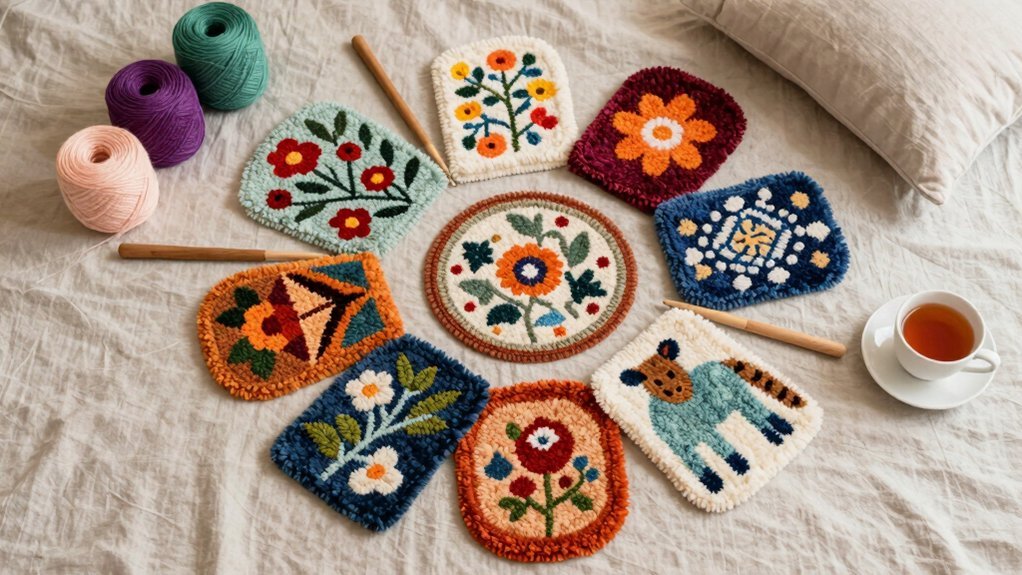


Leave a Reply